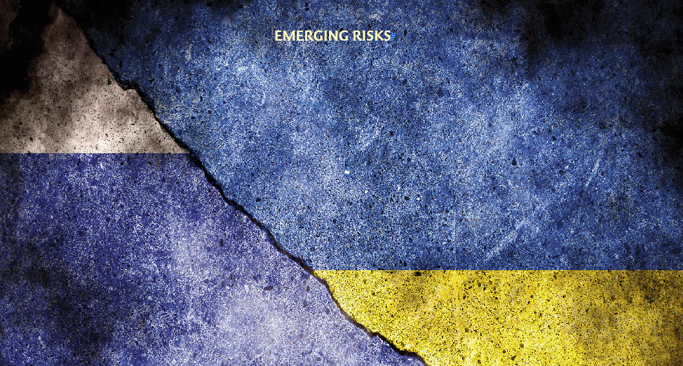CHALLENGE AND CHANGE
Beazley report raises concerns for
agents and brokers
By Elisabeth Boone, CPCU
Events so far this year have significantly altered how business leaders see the risks they face. Also altered is how the leaders perceive their resilience to these risks—a perception that has fallen dramatically since 2021.
The findings are contained in Beazley Group’s latest Risk & Resilience research into geopolitical risk, which was published in June.
The impact of inflation is causing deep concerns about domestic stability alongside the fear that global tensions are increasing the threat from external forces. As businesses struggle to adjust to this new reality, preparedness and mitigation strategies are becoming key focus areas.
According to the report, across the United States and United Kingdom, few business leaders feel well able to manage current geopolitical risks. Concerns about the possible consequences of war are spiking upwards compared with last year; and in the first year Beazley has asked the question, inflation has become a dominant issue.
The report’s results paint a troubling picture:
- It is urgent that businesses build resilience as they face a high-risk/low-resilience geopolitical environment.
- Inflation is a dominant threat with 65% of U.S. business leaders believing they lack the necessary resilience to deal with it, while 55% of business leaders in the U.K. hold this belief.
- The proportion of business leaders ranking war and terror as their top risk is up 46% over the previous year.
- Economic uncertainty is up 31% over the year before.
- Rising prices and an unpredictable economic environment are driving instability and civil unrest as already have been seen in Sri Lanka, with countries such as Egypt and Turkey also possibly vulnerable.
- S. business must confront the double threat of unpredictability at home from rising gun violence, while as a world superpower it is facing up to a watershed in geopolitics as its relationships with Russia and China shift.
- Business leaders need to better understand their geopolitical risks and prepare for and seek to mitigate them where possible. Specialized political risk, trade credit, and terrorism insurers have a role to play in offering appropriate coverage that provides the needed risk mitigation.
Informed commentary
To gain insights into the report and its implications for agents and brokers, Rough Notes spoke with Roddy Barnett, Beazley’s head of political risk and trade credit. He joined Beazley 16 yearsago and has always held roles in political risk and trade credit. His team is responsible for supporting cross-border trade and investment flows, mainly in emerging markets, and providing coverage against financial losses caused by political events and related economic risks.

“The major message that brokers should pass on to clients with overseas exposures is the importance of considering the risk to your balance sheet of events that occur, even when they are not necessarily close to home.”
—Roddy Barnett
Head, Political Risk and Trade Credit Beazley Group
“Our recent Geopolitical Risk & Resilience report presented a couple of important data points about escalation of risk managers’ view of war and terror and economic uncertainty,” Barnett says. “It’s particularly inter-esting to note that the survey was done in January, at which time business leaders flagged issues that have become more acute in the months that followed—including inflation, the invasion of Ukraine, an increasingly complex sanctions regime against Russia, disruption to energy and food markets (which has not helped with supply chain and inflation issues), and questioning of relationships with China.
“In response,” Barnett continues, “Beazley offers effective trade policy credit, which covers defaults of various buyers. For businesses with global exposures (foreign subsidiaries, trading relationships/supply contracts, and so on), we offer cover for contracts being frustrated because of political risk, embargo, default, and sanctions. We also provide cover against loss of investments caused by war, terrorism, government seizure, and related perils.
“The major message that brokers should pass on to clients with overseas exposures is the importance of considering the risk to your balance sheet of events that occur, even when they are not necessarily close to home. They still could affect your business. As energy and food prices go up, for example, and countries can’t pay for their imports, you could have a sovereign default situation or secondary economic depression (this is happening now with Sri Lanka, for example). This may all be taking place far away from your business but could still affect your supply contracts and other operations.
“Risks are likely to become more complex, and this is being recognized by businesses. In response, our client base is asking for cover. We’re also seeing an expansion of countries where companies want political risk cover–including the Baltics and Central Asian former Soviet republics,” Barnett explains.
“Against a challenging backdrop,” he cautions, “business strategies are now at a point of inflection. Even those territories far removed from the theatre of war in Eastern Europe are feeling the impact of global sanctions and commodity shortages on risks across the board from supply chain to cyber to political risk and trade credit.
“Businesses need to know that as we face a moment of geopolitical change, which is fraught with unpredictability, they can protect overseas physical assets and their human capital both at home and abroad by actively investing in a mixture of risk management and effective insurance cover.”
Highlights from the report
A number of other key findings are contained in the Beazley Geopolitical Risk & Resilience report, which is based on findings from research the company conducted with business leaders of over1,000 firms of varying sizes and across10 different industry sectors in the U.S. and U.K.: healthcare and life sciences; manufacturing; retail, wholesale, food and beverage; real estate and construction; hospitality, entertainment and leisure; financial institutions and professional services; energy and utilities (including mining), public sector and education; tech, media, and telecoms; marine and warehousing.
The report identifies issues that the insurance industry needs to address, and it seeks to inform and stimulate debate about how it can adapt to meet client service expectations in the new world order.
Among the findings: Trust in insurance appears to have increased, but what business leaders want from it has ex-tended beyond pure financial protection. Balance sheet strength, a solid reputation, and a swift and smooth claims handling process now seem to be expect-ed. Business leaders want insurers and brokers to demonstrate better under-standing of their operations and the risks they face.
Insurance buyers are looking to the industry to add genuine value to their business by providing regular risk insights, risk management tools, services, and flexible coverage tailored to their sector and business size.
Delivering on these expectations in today’s complex international global risk environment means that the industry needs to take stock. A challenge for the industry is how to better apply data and claims insights to help clients future proof their businesses against ongoing known and unknown risks such as cyber, supply chain, and environmental, social, and governance concerns.
Research results show that the industry is at a point of inflection and needs to rethink its approach to service. In particular, the industry needs to reconsider the historical tripartite relationship among brokers, insurers, and clients and to improve communication to establish and maintain genuine productive relationships with clients.
Clients speak out
Beazley explored how business leaders feel about four key areas of risk: technology, business, political and economic, and environmental, both now and in 12 months’ time.
The technology risk category is ranked as a top concern by a consider-able margin, with 37% of business leaders in the U.S. and U.K. perceiving it to be their most pressing area of concern. This proportion increases to 39% as the research looks ahead 12 months. Although these risks are challenging to manage, the report says, executives are not in a mood to wave the white flag anytime soon.
- Cyber is the highest ranked risk in the technology risk category, particularly by those in the U.S., but companies feel better prepared to manage it than any other risk.
- Disruption risk: Ranking a close second to cyber concerns is concern about failure to innovate and keep pace with new developments, customer demand, or market shifts. Among U.K. respondents this is the key concern, and businesses feel much less well placed to anticipate and manage this risk.
- Tech risk: Successful companies have harnessed a combination of astute hiring and investment to ensure that they manage this threat appropriately. Consequently, resilience scores are high (a median of 44% of U.S. and U.K. businesses feel very prepared for tech risk challenges).
- Intellectual property (IP): The outlier is the failure to protect the value of IP and other intangible assets. This is a risk that business leaders feel well prepared to manage, but that few rank as a top concern. Beazley’s view, given that intangible assets are the predominant source of economic value for many businesses, is that this is a blind spot that requires more forceful remediation.
Key concerns
Specific issues identified in the Beazley Geopolitical Risk & Resilience report include:
- 25% of business leaders say they struggle to navigate their risk exposures and coverage needs
- 19% find it hard to get insurance that is tailored for their sector or specialized business
- 44% don’t think insurers understand their business
In terms of expectations, 48% of respondents say their trust in insurance has increased and 31% want to explore options that include risk and crisis management. The top three asks from their insurance partners are:
- A deep understanding of risk by sector and size
- Specialized risk advisory services as part of their policy
- Comprehensive, straightforward coverage
Disparity exists in companies’ risk preparedness:
- 32% are focused on investing in home/flexible working hours for employees
- 25% have yet to create a risk register
- 32% of executives are planning to invest in their risk data analytic capabilities
- 5% of respondents in the U.K. are prioritizing coverage for intangible assets.
For more information:
Beazley Group
www.beazley.com
The author
Elisabeth Boone, CPCU, is a freelance journalist based in St. Louis, Missouri.





